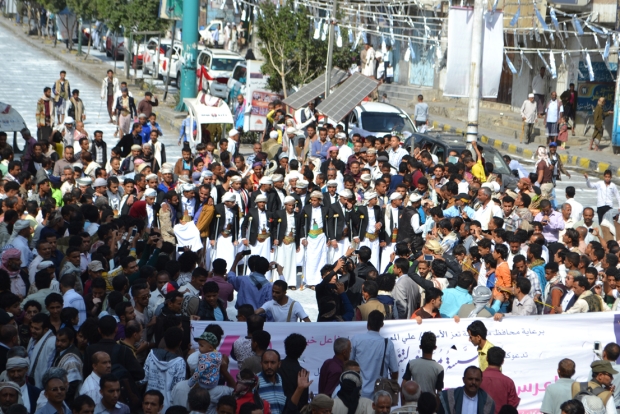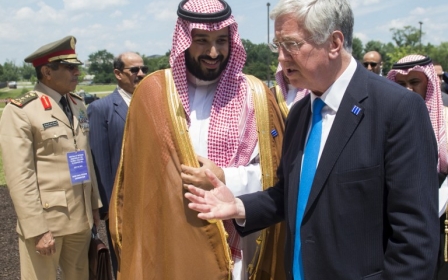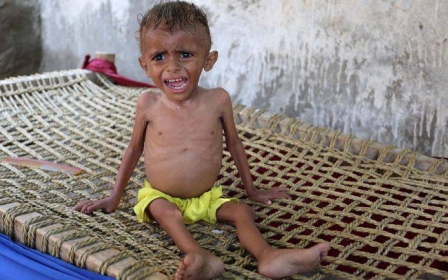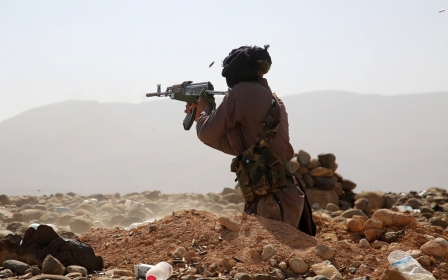Wounded Yemen fighters hold mass wedding amid civil war
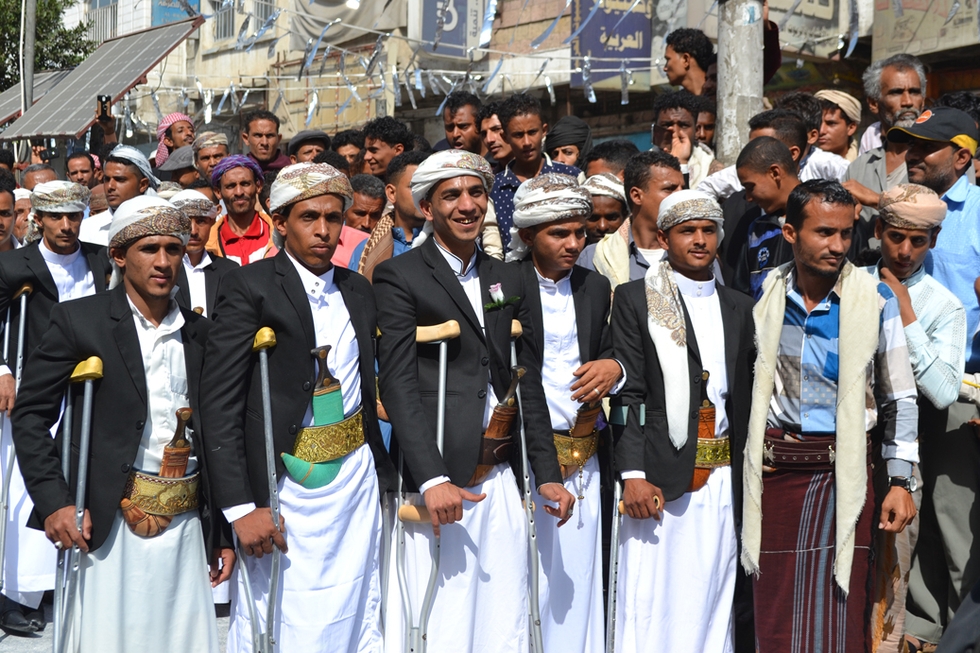
TAIZ, Yemen - Mazen al-Barakani had just graduated from secondary school in Taiz when he joined the Popular Resistance in January 2016. The 20-year-old fought Houthi forces which had besieged the southern Yemen.
In February, when the fight for control of the city was at its peak, he volunteered to fight on the frontlines during an attempt to break the siege from the southwest.
"It was an honour to be on the frontlines of breaking the siege,” Barakani told Middle East Eye. “The Houthis had planted hundreds of land mines in the al-Dhabab area to stop our advance, so many fighters sacrificed their lives in the advance.”
By March, dozens of the anti-Houthi fighters were dead and many more were wounded, including Barakani, who had lost a leg from a land mine.
"After the land mine exploded, I was unconscious and had no idea what was going on around me. When I woke up I was in al-Thawra hospital without my left leg. One of my friends lost both legs and the others died."
New MEE newsletter: Jerusalem Dispatch
Sign up to get the latest insights and analysis on Israel-Palestine, alongside Turkey Unpacked and other MEE newsletters
Now, even with the aid of a prosthetic leg and a crutch, he can hardly walk unaided. But alongside 19 of his fellow war amputees, he took part in a mass wedding in the centre of Taiz on Saturday.
The mass wedding was for fighters who lost either one or both legs in the fight for control of Taiz. It was paid for by a philanthropist and organised by Muath Developmental Foundation, a charitable foundation that helps poor people and victims of the war in Taiz province.
The philanthropist, who asked to remain anonymous, paid $2,600 for each groom and gave some gifts as part of the dowry. The mass wedding included 20 grooms, but the number of people who have lost a leg in the city numbers almost 200.
"I am still only 20 years old, and it is early for me to marry - but my leg has forced me to get married now, as I need someone to look after me," said Barakani as he thanked the philanthropist and Muath Developmental Foundation for organising the wedding.
Zakaria al-Barakani, Mazen's brother, said he was encouraged to see that the foundation was assisting people who have lost limbs.
"I think all young wounded people have to get married, as their wives can help them in their daily lives and this is the least award they can get," Zakaria told MEE.
Hundreds of civilians attended the first mass wedding of wounded fighters, but because a charitable foundation hosted it, no military leaders or government officials were present.
Some of the 20 grooms had lost one or both legs in battle, but some also lost their vision or hearing.
Husam al-Ghazali, 29, who lost his leg and sight, told MEE: "I cannot either walk nor see, but I am happy today that I found some people who want to help the injured and those who cannot walk."
Ghazali, who has a speech impediment, explained that he was wounded in March 2016 by shrapnel of a Houthi shell in al-Beirarah, an area west of Taiz city.
The mass wedding on Saturday took place in the centre of the city, as clashes continued in the surrounding areas. Undeterred, people celebrated, with music playing loudly.
Injured fighters a priority
The head of Muath Developmental Foundation, Abdul Hamid al-Yousofi, said they have plans for more mass weddings for fighters who had legs amputated, a main priority for the foundation.
"We chose the people who lost a leg or both because they sacrificed parts of their bodies for the sake of their city, and they are a main reason for breaking the siege and liberating most of Taiz city, and they need someone to look after them," Yousofi told MEE.
"No one can compensate people for their legs, but we are trying to help them go on with their lives as normally as possible," he added.
Some fighters told MEE they were dismayed that they were not included in the first batch of grooms.
Yaseen Ghalib, 25, a fighter for the Popular Resistance, lost his left leg while fighting west of Taiz city, but he was not chosen to be a groom.
"It is a good step for Muath Foundation to help us, but I do not know why they declined to enter my name in the first batch. My mother is an old woman and she cannot help me, my father is busy with his work as a driver, and my siblings are busy with their own lives, which is why I need a wife to look after me," Ghalib told MEE.
A Houthi sniper shot Ghalib in his left leg in October 2016. He was taken to al-Thawra hospital to receive treatment, but doctors decided to amputate.
Yousofi confirmed that there are still 156 wounded fighters like Ghalib who want to get married, but the foundation does not have enough funds for another mass wedding and is seeking other philanthropists who can help. The foundation said it chose the most dire cases for the first wedding.
Barakani is grateful he was chosen. "I thank the philanthropist who paid for my marriage, as he created happiness in our hearts and I hope to see all of my friends who lost a leg or both married soon."
Middle East Eye delivers independent and unrivalled coverage and analysis of the Middle East, North Africa and beyond. To learn more about republishing this content and the associated fees, please fill out this form. More about MEE can be found here.


